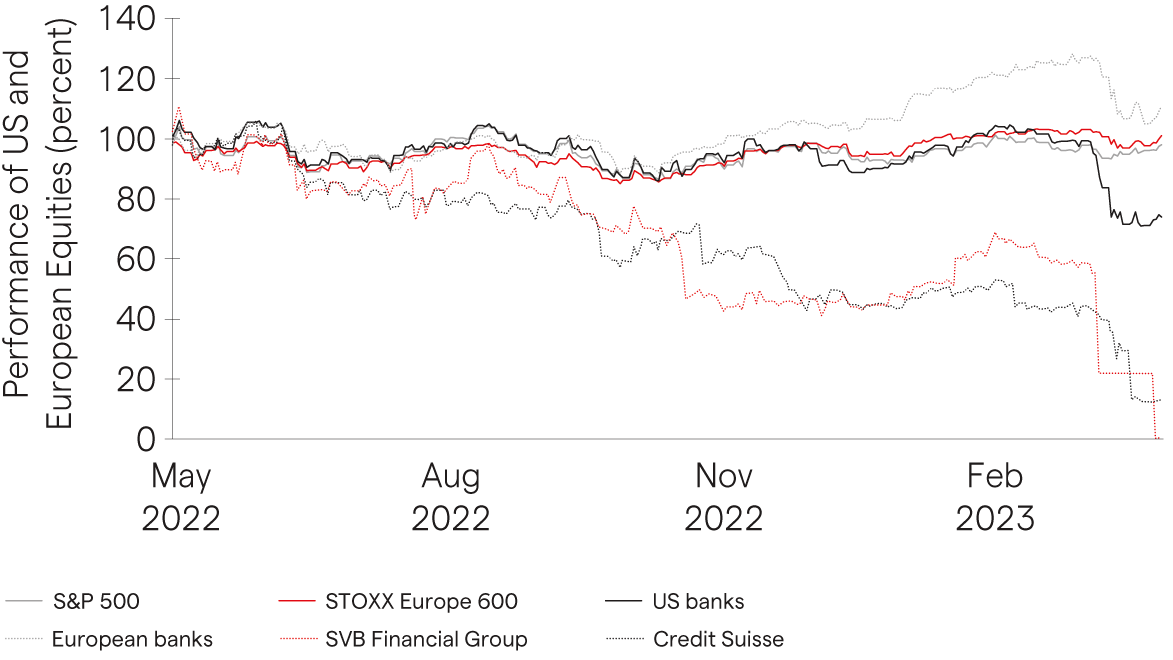Journalists commonly make the criticism that financial regulators, just like generals, are always fighting the last war. While the observation may be valid, it’s questionable whether regulators can ever future-proof the financial system, given its inherent instability. Moreover, it appears that today’s regulators are indeed looking to the future and not the past as they seek to learn lessons from the March banking crisis. Consequently, hedge funds and other non-bank financial intermediaries, an increasingly influential force in the global financial system, are coming under scrutiny.
Why the US banking crisis is prompting a fresh regulatory crackdown

Banking crisis follows familiar pattern
The March banking crisis, which prompted sharp falls in equity and bond markets, followed a pattern familiar to anyone with even a passing knowledge of previous periods of turbulence in the global financial system. The failure of regional banks in the US and the demise of Credit Suisse in Europe exposed regulatory failures and poor risk management, and the collapses were triggered by a prolonged and significant increase in interest rates. That mirrors how the 2008 global financial crisis unfolded.
Banking turmoil jolts financial markets

Moreover, further tremors – or worse – could yet follow. Lucrezia Reichlin, professor of economics at the London Business School, for example, recently told the International Monetary Fund (IMF) that she expects other banking crises to happen – especially if central banks continue to tighten monetary policy. She explained that ‘banking crises cannot be prevented in all contingencies, at least not in a fractional reserve system where loans don’t need to be fully backed by deposits, like the system we have today’. She added that ‘the recent crisis is a painful reminder of the fundamental instability of banks’ business model’. 1
Attention switches to hedge funds, asset managers, family offices etc
Nonetheless, regulators are under pressure to act – and it looks like non-bank financial institutions, such as hedge funds, asset managers and family offices, are likely to be a key area of their measures. The Financial Stability Oversight Council in the US, for example, has proposed guidance to make it easier to designate non-bank financial institutions for regulatory supervision, together with new procedures to better identify and respond to financial-system risks.
US Treasury Secretary Janet Yellen has also raised concerns about these institutions being a potential source of financial instability because of a lack of supervision.2 The focus on non-banks appears perverse, given that it was banks that failed in March. However, a look at the latest IMF Global Financial Stability Report, released in April, shows just why officials are looking at other areas of the financial system.
The report concludes that banks represent a smaller portion of the global financial system than they did at the time of the 2008 financial meltdown, and that the murky area of non-banks presents a new array of financial dangers.3 Non-bank Financial Intermediaries (NBFIs) now account for some 50% of global financial assets, up from 40% in 2008, according to the IMF. Moreover, their use of financial leverage and exposure to illiquid assets has soared since the global financial crisis: insurance companies, one of the largest non-bank sectors, have doubled their illiquid investments over the last decade, says the IMF.
The Wall Street Journal has also highlighted the opaqueness of the sector, arguing that:
‘Because nonbanks can be as different from each other as they are from banks, they defy any straightforward regulatory oversight. This thwarts efforts to gather comprehensive data on their activities.’4
Then, as the IMF points out, there is the growing interconnectedness of the banking and non-banking sectors.
The IMF’s report also sums up why it is non-banks that are now attracting so much attention:
‘The combination of poor market liquidity, high leverage, and a high degree of interconnectedness between NBFIs and banks is most dangerous to the financial system because it can amplify asset prices changes and spread stress to corners of the financial system that ex ante may seem to have little in common.’
1 https://www.imf.org/en/Publications/fandd/issues/Series/Analytical-Series/cafe-econ-early-lessons-from-the-recent-banking-turmoil
2 https://asia.nikkei.com/Business/Finance/U.S.-to-tighten-rules-on-nonbank-firms-risk-assessmen
3 https://www.imf.org/en/Publications/GFSR/Issues/2023/04/11/global-financial-stability-report-april-2023
4 https://www.wsj.com/articles/you-dont-need-a-banking-crisis-for-a-financial-meltdown-regulation-credit-suisse-svb-venture-capital-hedge-funds-nonbanks-54485d5c
Publication date:
This information has been prepared by IG, a trading name of IG Markets Limited. In addition to the disclaimer below, the material on this page does not contain a record of our trading prices, or an offer of, or solicitation for, a transaction in any financial instrument. IG accepts no responsibility for any use that may be made of these comments and for any consequences that result. No representation or warranty is given as to the accuracy or completeness of this information. Consequently any person acting on it does so entirely at their own risk. Any research provided does not have regard to the specific investment objectives, financial situation and needs of any specific person who may receive it. It has not been prepared in accordance with legal requirements designed to promote the independence of investment research and as such is considered to be a marketing communication. Although we are not specifically constrained from dealing ahead of our recommendations we do not seek to take advantage of them before they are provided to our clients. See full non-independent research disclaimer and quarterly summary.
Contact us
Let us create a solution tailored for your needs. Get in touch with our team by phone or email to discuss your objectives, or request a brochure.




